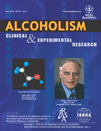Bioinformatic resources suggest that adipose tissue expresses mRNAs for alcohol dehydrogenases (ADHs) and ALDH2, and epidemiological studies indicate that heavy alcohol use reduces adipose tissue mass.
We therefore characterized the expression of alcohol metabolizing enzymes in human, rat and mouse adipose tissue, preadipocytes, and adipocytes, the ability of adipocytes to metabolize ethanol, and the effects of ethanol on differentiation of human adipose stromal cells (hASCs).
We therefore characterized the expression of alcohol metabolizing enzymes in human, rat and mouse adipose tissue, preadipocytes, and adipocytes, the ability of adipocytes to metabolize ethanol, and the effects of ethanol on differentiation of human adipose stromal cells (hASCs).
Adipose tissue, preadipocytes, and adipocytes were collected from rodents or from humans undergoing bariatric surgery. hASCs were differentiated in vitro using standard methods. Gene expression and cellular differentiation were analyzed by Western blotting, RT-PCR, and microscopy.
Class I ADH was expressed in human > mouse > rat adipose tissue, whereas ALDH2 was high in all samples. ADH, catalase, and ALDH2 were induced during differentiation of hASCs. The presence of 50 mM ethanol markedly reduced the differentiation of hASCs; this effect was associated with inhibition of expression of transcription factors required for differentiation, but did not depend on the ability of the cells to metabolize ethanol.
Human adipose tissue expresses alcohol oxidizing enzymes. The presence of ethanol at physiologically relevant concentrations inhibits differentiation of hASCs. Ethanol could alter adipose tissue biology, inducing a form of acquired lipodystrophy, which is consistent with epidemiological studies.
Read Full Abstract
Request Reprint E-Mail: dcrabb@iupui.edu
Read Full Abstract
Request Reprint E-Mail: dcrabb@iupui.edu
